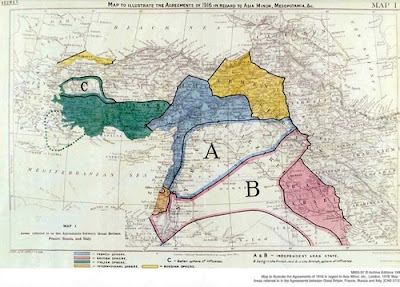They're going to tell you that Sykes-Picot created the modern borders of the Middle East (only a few of them), that it is being overturned by ISIS (even less so), that it was ever really implemented /imposed (only in a limited sense), and that all the problems of the Middle East stem from it (a bit more arguable), not to mention that the whole reason that the Middle East is such a
Not because I approve of British and French diplomats carving up the Middle East while a) not asking the locals what they wanted and b) in the British case, promising the Promised Land to themselves, Jews, and Arabs at the same time. The fact is, though, that Sykes-Picot is not what you think it is because, as I've ranted before, and in fact more than once, Sykes-Picot, deplorable as it may have been, was never implemented as written.
Look at the map above. Does it look like today's Middle East? In addition to the British and French (pink and blue) zones, Zones A and B are areas of their influence. France controls Mosul, Kirkuk, and northern Iraq. Britain gets the rest of Iraq, plus southern Palestine, while northern Palestine and Jerusalem are internationalized. Russia controls Constantinople and the Straits, and Armenia. Italy gets its own pound of flesh. But that is not the postwar map of the Middle East.
The reason is simple: "Sykes-Picot" has become a convenient shorthand for "the entire postwar settlement of the Ottoman territories," not the original agreement.
My readers who have studied the history know this: even before the agreement the Hussein-McMahon correspondence, and soon after,the Balfour Declaration, the Paris Peace Talks, the Treaty of Sèvres, the San Remo Conference, the Treaty of Lausanne, and other agreements.
I will be discussing the whole postwar settlement package in coming days. My goal is not to exonerate Sir Mark Sykes and M. Picot, but to place their colonial enterprise in broader context.






6 comments:
While this comment is correct, the actual borders of influence of the Sykes-Picot arrangement are of little consequence. The real point is how Britain and France eventually carved up the area of the Ottoman Empire and drew borders of convenience TO THEM. The wishes of the people in that land were ignored. In true colonial fashion, the British construction of Iraq put three groups together and then installed a Sunni as king. Since the Sunni were a distinct minority to the other two groups, this meant that the Sunni were dependent on British military power in order to stay in power.
The Ottoman Empire joined the losing side in a global war of aggression. Being carved up and conquered by the victors is every but just and proper for a conquered, aggressive people. I love how all the Sykes picot critics conveniently ignore why Sykes and picot were there in the first place. To dispose of the justly earned spoils in a war they won, but did not start.
The Ottoman Empire joined the losing side in a global war of aggression. Being carved up and conquered by the victors is every but just and proper for a conquered, aggressive people. I love how all the Sykes picot critics conveniently ignore why Sykes and picot were there in the first place. To dispose of the justly earned spoils in a war they won, but did not start.
Did people in the Middle East , who lived under one imperialistic regime after another (the European was actually the shortest period, and they eventually let them get independent) actually know what they wanted? Did the Greeks, Romans, Eastern Christians (Byzantium), Muslim conquerors, Ottomans and the rest ( just picking the primary ones) ever ask "them"? And if they asked, would it have created a peaceful Middle East with different borders, or, more likely, an on-going war of everybody with everybody only a hundred years earlier than have actually taken place?
What "Anonymous" wrote at May 13, 11:47 am EDT is important to understand, not necessarily for its political insights, or whether you agree with same or not, but because its logic is valid and stands as an important rebuttal to masses of thinkers who think that if you remove(d) the putative cause of a problem then there would have been no problem. The fact is we don't know that, and its a foolish assumption. Critics of Sykes-Picot are just assuming a simplistic cause-and-effect relation, completely ignoring other factors and processes and agendas at play. Put another way, reading the past is almost as fraught as predicting the future.
Indeed, there's so much smoke out there, and the thing had in fact hardly caught any fire.
Well, it's not really like that - it did and still does have negative consequences, for the Middle East especially, and it is appalling as a way to conduct yourself as a power. But its consequences as a whole had served the interests of the signatories pretty well, and powerful countries prefer making important geopolitical decisions without morality being of primary concern.
I wrote about this myself a little time ago, if you care you can take a read here: https://turritopsisdohrniiblog.wordpress.com/2015/12/07/an-overwiev-of-the-drawing-board/
Anyway, It isn't that strange to come across so many partially informed opinions these days (years). The emotions are high with everything that's happening, people need to assign blame. It needs to be said though, that it goes the other way too. Some attempt to completely absolve Sykes-Picot, which is equally wrong.
Post a Comment